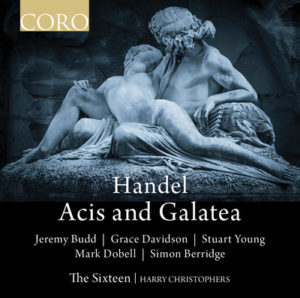Fine performances of Handel’s delightful, brief pastoral are not rare: John Butt leads the Dunedin Consort in a five-voice version (as it was in 1718 at the premiere) that is crystal clear and spotless; William Christie’s 1998 performance is elegant and florid; Mendelssohn’s German version is available from John Eliot Gardiner; Christian Curnyn’s band plays with intensity. All treat the work with a combination of jollity and gravity given its dramatic arc, and each has the whiff of the outdoors in the clean playing and spacious recording. And one cannot overlook the grand approach by Adrian Boult, with a surprisingly light Joan Sutherland and a fish-out-of-water Peter Pears.
Add this new winner under the baton of Harry Christophers and you find quite a recorded legacy. Opera, oratorio, or serenade, with music merry and melancholy, sensual and innocent, we find ourselves on “verdant plains”, with a shepherd named Acis who loves the nymph Galatea, and a Cyclopsian giant named Polyphemus who is jealous of their love. Damon a wise shepherd/pal of Acis’ offers him advice; Coridon, another wise shepherd, attempts to calm Polyphemus’ violence. He fails, and Polyphemus kills Acis with a boulder; Galatea (she’s part goddess) turns the dead Acis into a stream (or a fountain) that will flow forever.
A wonderful quintet of singers illuminates all of Handel’s music. Grace Davidson’s pure-as-snow soprano is equally at home in Galatea’s “Hush ye pretty warbling quire”, with its right-on trills and delicate filigree, as she is in the mournful “Must I my Acis still bemoan”, with the help of the chorus. Jeremy Budd’s light but centered tenor is strong enough for “Love sounds th’alarm” and smooth enough for “Love in her eyes sits playing”, sung with great warmth. Damon is Mark Dobell, and he’s fine in “Consider fond shepherd”, while Simon Berridge’s Coridon convinces with “Would you gain the tender creature?” But all ears fall to Stuart Young’s buffoon-like, murdering Polyphemus, from “I rage – I melt – I burn” through his big sopranino recorder-accompanied aria and his part in the pre-murder trio.
If you’re uncertain about whether this is for you, listen to the “Happy we” chorus, just 5 voices strong, for clarity, wit, and joy in music making, and you’ll decide. The slimmed down forces, by the way, are in line with Handel’s first performance of the work.
































